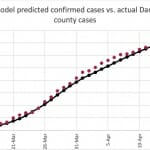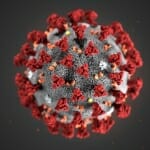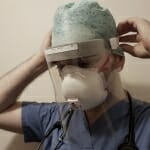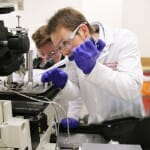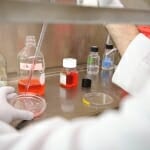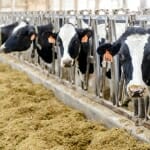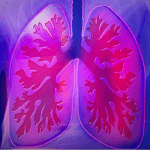Category Health & Wellness
UW–Madison engineer works with local health leaders to develop COVID-19 prediction models
The models use a swath of relevant, research-based parameters to predict the number of cases of in the region. Read More
School of Pharmacy team produces hand sanitizer for UW Health
The school's Zeeh Pharmaceutical Experiment Station started production on March 20 and, in less than a week, provided more than 100 gallons of vitally important sanitizer. Read More
Chilling concussed cells shows promise for full recovery
“You can’t cool too little; you can’t cool too much; and you can’t wait too long following an injury to start treatment,” says mechanical engineer Christian Franck. And when the researchers identified that sweet spot, the results were striking. Read More
New master’s degree in health informatics meets industry need
The degree provides students with the experience and foundation they need to create innovative solutions aimed at improving current health care practices. Upon graduation, they should be prepared to make data-driven decisions in health policy, data security and clinical practice. Read More
Taking survey can help thwart COVID-19, spread Wisconsin Idea
Based on your responses, a UW–Madison team will design a social media campaign to successfully encourage healthy behavior. Read More
UW Health March 19 Daily Update: Caring for Cancer Patients
The University of Wisconsin Carbone Cancer Center continues to care for cancer patients by using telehealth technology, expanding screening, and extending in-home care options to address the unique challenges created by the COVID-19 pandemic. Read More
Six possible impacts of COVID-19 on farming
Only time will reveal the severity of the impacts on agriculture from the novel coronavirus. Here is what farmers, farming families, ag employers and ag employees need to be aware of and plan for. Read More
UW Health March 18 daily update: Increased Capacity for Telehealth and Virtual Visits
UW Health is leveraging telehealth technology in responding to the COVID-19 pandemic while also addressing our community’s more routine medical needs and appointments. Read More
UW Health March 17 update: Social distancing now even more important
With today’s announcement that we have community spread of the Coronavirus in the Madison area, we want to remind everyone that practicing social distancing is CRITICALLY important. Read More
March 17 changes to campus operations from Chancellor Blank
Our campus is continuing to monitor the rapidly changing COVID-19 pandemic, including spread of the disease and public health guidelines to mitigate its effects. In light of recent announcements, we have decided to take several additional steps for the rest of the semester: Read More
UW Health Daily Update for March 16: Social Distancing
Social distancing is a conscious effort to reduce contact between people to slow down the spread of the virus. Even if you are symptom-free and not part of an at-risk group, you still need to change your lifestyle for the time being. Read More
Guidance to employees on telecommuting
In response to the rapidly evolving COVID-19 pandemic, the Office of Human Resources is preparing for multiple scenarios related to work flexibility for employees, including the possibility that many employees may need to telecommute. Read More
UW–Madison responds to employee diagnosed with COVID-19
University officials are cooperating fully with Public Health Madison & Dane County and other public health officials regarding a university employee who works in the School of Veterinary Medicine building who was diagnosed with novel coronavirus infection (COVID-19). Read More

